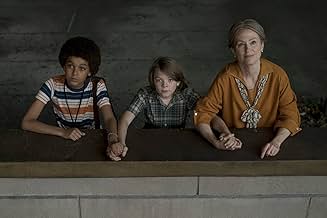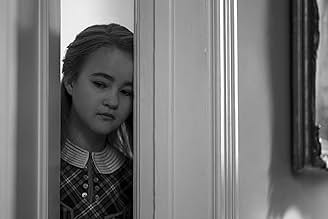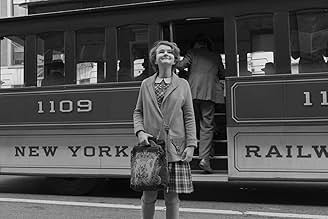Tells the tale of two children separated by fifty years. In 1927, Rose searches for the actress whose life she chronicles in her scrapbook; in 1977, Ben runs away from home to find his fathe... Read allTells the tale of two children separated by fifty years. In 1927, Rose searches for the actress whose life she chronicles in her scrapbook; in 1977, Ben runs away from home to find his father.Tells the tale of two children separated by fifty years. In 1927, Rose searches for the actress whose life she chronicles in her scrapbook; in 1977, Ben runs away from home to find his father.
- Awards
- 1 win & 35 nominations
Storyline
Did you know
- TriviaIn the book, the story of Rose is told alternatively without text but with graphics to allow the readers to experience Rose's story in the same way she felt escaping to New York City through her eyes and the silence of her life.
- GoofsWhen Ben enters the rotunda of the American Museum of Natural History, he walks past the mounted skeletons of the Allosaurus attacking a Barosaurus defending its young, as seen in the museum today. However, this exhibit was not mounted until 1991, and wouldn't have been seen in 1977.
- ConnectionsFeatured in WatchMojo: Top 10 Failed Oscar Bait Movies of 2017 (2018)
Featured review
...but it is far from a failure.
Usually, I refrain from commenting on films which I have been fortunate enough to see prior to release, but in this case, I am making an exception.
The early reviews I have seen, including the two posted here, realize that the work product is indeed problematic, and, while they don't say so, they ought to understand that it should have been reworked before the final edit. What they clearly DON'T understand is that Wonderstruck is a fantasy, not a melodrama. Are the two children real? Hardly. All the capers and coincidences and similarities are unbelievable for any realistic narrative. That doesn't matter. Wonderstruck is not credible story; it isn't supposed to be. In music, a composition like this would be "a fantasy on" some composition. We would hear identifiable themes set in a very expansive framework, creating a very different impression of a familiar setting. That's what Wonderstruck intends to do - establish a real world in which the deaf find themselves contained. It's not set up to accommodate them, so they adapt their own reality to exist in it. Is their reality real? To those of us who are not deaf, we can never know what it is to them. So how much of Wonderstruck is real and how much is fantasy, we will never really know. That's the point.
Now, having said that, the film does have problems, not the least of which is that the book's author, Brian Selznick, wrote the screenplay, rarely a good idea without at least having an uninvolved writing partner. He had two problems, both of which handicapped him. He was faced with adapting a 600+ page book into a 2-hour film. A lot of stuff had to be excised, and the original author is the entirely wrong person to be doing it. Author Brian Seltzer knows the material too intimately and is not prepared to inform us of basic information which he has long ago accepted as obvious. Moreover, book structure - and screenwriter Brian Seltzer seems to have adhered closely to it in this case - rarely work for films. Books move slowly. Books let the reader consume the information at his/her own pace, even allowing for back-reference for clarity. Movies dictate our comprehension and understanding. Few novelists get this, and it was Seltzer's main problem.
In the theatre, plays and musicals go "out-of-town" to "try out", the whole purpose being that the show can be viewed in action. The problems can become obvious, and the writers can get to work on fixing them. Films don't have this luxury. True, the final edit can be exhibited for test audiences, but these viewers are very aware of their exceptional status, and they are rarely a good cross section of the viewing public. Wonderstruck could have benefited from an "out-of-town" tryout - even several of them. Unfortunately, this is not a financial expenditure available to most films. Moreover, it would probably lay the film open to reviewers - both professional and amateur - who would delight in their chance to make a difference. (Don't believe it? How credible is Rotten Tomatoes?) Several reviewers have disparaged the talents of the child actors. These commentators have very little credibility in this respect. The intent of the author is that the kids be very ordinary, very everyday. Regular kids are as diverse as adults, but they are not adults; they are still learning how to be adults. They may go off on some adventure that seems quite obvious to them while appearing unacceptable, even ridiculous, to adults. The young actors here were often handicapped by unspeakable dialogue, especially for 12-year-olds. They did everything they could with it because it was not their job to change it or object to it. A good dialogue writer - even a good director - would have realized this and made the changes. (And it is amazing that a director of Todd Haynes' quality missed it - or at least didn't do something about it.) While Millicent Simmonds (Young Rose) is deaf, Oakes Fegley (Ben) presumably has no hearing disability. As an actor he had to convey the confusion he must feel at suddenly being unable to hear but still being able to speak - and within a few months time at that. He obviously had access to a qualified "coach", but he had to replicate a young boy suddenly faced with a life changing disability. I wonder if they were able to find a 12-year-old boy - suddenly deaf - who could have helped him. Probably not. So his reactions were probably his own, and for a young boy in those circumstances, his portrayal was probably as accurate as any. (Interestingly, the boy - Ben - in the book is born deaf in one ear, who suddenly becomes totally deaf. Had that been the film's character, perhaps the actor's task would have been much different.) In summary, Wonderstruck is not a bad film, just not quite ready for prime time. It is quite enjoyable on its own terms.
Usually, I refrain from commenting on films which I have been fortunate enough to see prior to release, but in this case, I am making an exception.
The early reviews I have seen, including the two posted here, realize that the work product is indeed problematic, and, while they don't say so, they ought to understand that it should have been reworked before the final edit. What they clearly DON'T understand is that Wonderstruck is a fantasy, not a melodrama. Are the two children real? Hardly. All the capers and coincidences and similarities are unbelievable for any realistic narrative. That doesn't matter. Wonderstruck is not credible story; it isn't supposed to be. In music, a composition like this would be "a fantasy on" some composition. We would hear identifiable themes set in a very expansive framework, creating a very different impression of a familiar setting. That's what Wonderstruck intends to do - establish a real world in which the deaf find themselves contained. It's not set up to accommodate them, so they adapt their own reality to exist in it. Is their reality real? To those of us who are not deaf, we can never know what it is to them. So how much of Wonderstruck is real and how much is fantasy, we will never really know. That's the point.
Now, having said that, the film does have problems, not the least of which is that the book's author, Brian Selznick, wrote the screenplay, rarely a good idea without at least having an uninvolved writing partner. He had two problems, both of which handicapped him. He was faced with adapting a 600+ page book into a 2-hour film. A lot of stuff had to be excised, and the original author is the entirely wrong person to be doing it. Author Brian Seltzer knows the material too intimately and is not prepared to inform us of basic information which he has long ago accepted as obvious. Moreover, book structure - and screenwriter Brian Seltzer seems to have adhered closely to it in this case - rarely work for films. Books move slowly. Books let the reader consume the information at his/her own pace, even allowing for back-reference for clarity. Movies dictate our comprehension and understanding. Few novelists get this, and it was Seltzer's main problem.
In the theatre, plays and musicals go "out-of-town" to "try out", the whole purpose being that the show can be viewed in action. The problems can become obvious, and the writers can get to work on fixing them. Films don't have this luxury. True, the final edit can be exhibited for test audiences, but these viewers are very aware of their exceptional status, and they are rarely a good cross section of the viewing public. Wonderstruck could have benefited from an "out-of-town" tryout - even several of them. Unfortunately, this is not a financial expenditure available to most films. Moreover, it would probably lay the film open to reviewers - both professional and amateur - who would delight in their chance to make a difference. (Don't believe it? How credible is Rotten Tomatoes?) Several reviewers have disparaged the talents of the child actors. These commentators have very little credibility in this respect. The intent of the author is that the kids be very ordinary, very everyday. Regular kids are as diverse as adults, but they are not adults; they are still learning how to be adults. They may go off on some adventure that seems quite obvious to them while appearing unacceptable, even ridiculous, to adults. The young actors here were often handicapped by unspeakable dialogue, especially for 12-year-olds. They did everything they could with it because it was not their job to change it or object to it. A good dialogue writer - even a good director - would have realized this and made the changes. (And it is amazing that a director of Todd Haynes' quality missed it - or at least didn't do something about it.) While Millicent Simmonds (Young Rose) is deaf, Oakes Fegley (Ben) presumably has no hearing disability. As an actor he had to convey the confusion he must feel at suddenly being unable to hear but still being able to speak - and within a few months time at that. He obviously had access to a qualified "coach", but he had to replicate a young boy suddenly faced with a life changing disability. I wonder if they were able to find a 12-year-old boy - suddenly deaf - who could have helped him. Probably not. So his reactions were probably his own, and for a young boy in those circumstances, his portrayal was probably as accurate as any. (Interestingly, the boy - Ben - in the book is born deaf in one ear, who suddenly becomes totally deaf. Had that been the film's character, perhaps the actor's task would have been much different.) In summary, Wonderstruck is not a bad film, just not quite ready for prime time. It is quite enjoyable on its own terms.
- How long is Wonderstruck?Powered by Alexa
Details
- Release date
- Country of origin
- Official sites
- Languages
- Also known as
- Kutup Yıldızı
- Filming locations
- Production companies
- See more company credits at IMDbPro
Box office
- Gross US & Canada
- $1,060,377
- Opening weekend US & Canada
- $65,882
- Oct 22, 2017
- Gross worldwide
- $3,285,916
- Runtime1 hour 56 minutes
- Color
- Sound mix
- Aspect ratio
- 2.35 : 1
Contribute to this page
Suggest an edit or add missing content


































